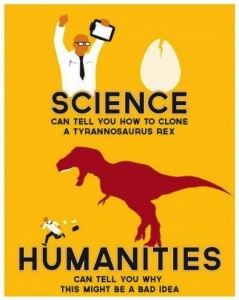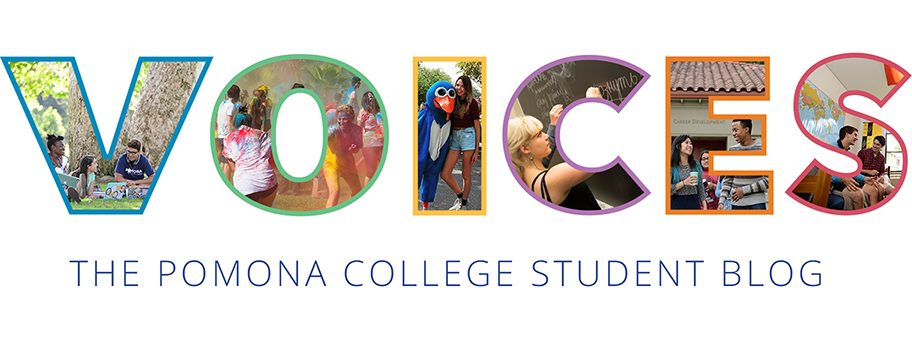Flip a coin. As long as you’re using a real coin (as opposed to a trick one), you can call whichever side you want, but you can’t have both. “Head I win, Tails you lose” is not an option. This is just the way that coin-flipping goes. In a similar fashion, many of the ways in which people approach situations, make decisions, and render judgments for things beyond a simple coin flip are based upon a binary like this: you can have one or the other, but you can’t have both. When I was considering colleges as a rising high school senior, this was one of my biggest fears; when I got to college, would I be forced to pick between sciences, my intended area of study and future career, and the humanities, which are more intellectually appetizing, but largely irrelevant for my career development? This binary is a fairly common subject of discussion not only among high school and college students, but also in the national conversation over higher education, and it’s true that many people, especially those on rigorous science tracks, are eventually forced to choose one at the expense of the other. I refused to let that be the case for me, and that’s why I’m at Pomona: so that despite choosing to be a science major, my decision isn’t at the expense of the humanities, and that I can take as many of those humanities classes as I want / as will fit into my packed schedule.
Now if you haven’t heard, there’s a national debate going on regarding the value of the humanities. Should these subjects be funded, staffed, and generally treated on par with the STEM (science, technology, engineering, math) subjects? What of the fact that statistically, STEM majors are more likely not only to be employed, but to be employed with higher salaries throughout their careers? I’d actually never heard about this national dialogue until sponsor training in August, which I imagine is (hopefully) because this is not as much of a controversy at Pomona where the values of a liberal arts education reign supreme. But in any event, it’s clear that many people don’t see the point or value of taking humanities classes, regardless of your major, and some people go so far as to say that higher education should no longer include departments such as art, theatre, philosophy, religious studies, etc. So why is it so important for me, as a science major, to have the humanities, and why is it that I’m at Pomona?
For me, it comes down to my view of a college education at its most basic core. I’m not at Pomona just to be a science major, and in fact, I’m not even here just to be a student. I’m here to be a person, a community member, a leader, a participant, and a component of the living, breathing organism that is the 5C’s. That’s why I value humanities. On one hand, my education in science will teach me more about the natural world. It can tell me why my body works the way it works and why I look vastly different than a fish. It can tell me why all of our buildings in Southern California have to be specially designed and retrofitted. It can tell me how different compounds form. It can teach me how to quantify, how to calculate, how to evaluate, and how to examine. My education in science will help me to achieve my dream of being a paleontologist. It can help me to get into graduate school. It can help me to get into a doctoral program. It can help me to get a job. These things are all very important to me. But that’s only one side of the coin.

The other side is my education in the humanities. This education will teach me about the human world. It can tell me what it means to be an Asian American. It can tell me what it means to live in a country founded on principles of “life, liberty, and the pursuit of happiness.” It can tell me how to understand and how to express myself. It can teach me how to reflect, how to question, how to think, and how to understand. My education in the humanities will probably not (directly) help me to get into graduate school. It probably will not (directly) help me to get into a doctoral program. It probably will not (directly) help me to get a job. But in countless indirect and intangible ways, it will help me to do all of these things. It will help me to be a a better student, a better teacher, and a better scientist. And most importantly, it will help me be a better person. This is the other side of the coin.
If you take an imaginary thin blade and slice a coin in half, you have just that: two halves. The half can survive on its own, but to be quite honest, it has become rather useless. After all, what can you do with a coin that has only one side? You probably can’t even trick a vending machine into taking it. To me, that’s what having to make a firm choice between science and the humanities would be like. And I prefer my coins to be whole. So that’s why I’m here. Because despite being a science major, I’ll always love the humanities. I’ll always enjoy a good discussion. I’ll always take the opportunity to write a paper (well most of the time anyway). Pomona gives me the opportunity to expand upon, rather than forcing me to constrict, my academic and intellectual passions. I know that the administration is watching, and perhaps even engaging in, this national debate about the humanities, and I hope that we have a say in the way that higher education is being shaped given our role as a prominent liberal arts college. But more than that, I hope that Pomona stays just the way it is now: a place not just for students and not just for majors, but for humans, for intellectuals, for dreamers, and, most importantly, for overachievers; after all, what else do you call people who want to take classes in just about everything?
